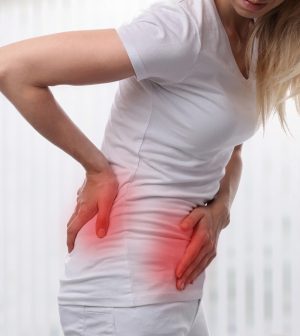- Could Your Grocery Store Meat Be Causing Recurring UTIs?
- Are You Making This Expensive Thermostat Error This Winter?
- Recognizing the Signs of Hypothyroidism
- 10 Strategies to Overcome Insomnia
- Could Artificial Sweeteners Be Aging the Brain Faster?
- Techniques for Soothing Your Nervous System
- Does the Water in Your House Smell Funny? Here’s Why
- Can a Daily Dose of Apple Cider Vinegar Actually Aid Weight Loss?
- 6 Health Beverages That Can Actually Spike Your Blood Sugar
- Treatment Options for Social Anxiety Disorder
Foods High in Added Sugars Might Raise Your Odds for Kidney Stones

There is a long list of reasons to avoid high-sugar foods, and a new study may be adding one more: kidney stones.
Researchers found that among over 28,000 U.S. adults, those with a lot of added sugars in their diet were more likely to have a history of kidney stones. People in the group downing the most sugar were 39% more likely to have had stones, versus those who consumed the least sugar.
The findings — published Aug. 4 in the journal Frontiers in Nutrition — do not actually prove that sugar is the culprit.
And for people trying to prevent kidney stone recurrences, it’s best to focus on more precise diet advice aimed at the stone-forming chemicals in their urine, according to Dr. Johnathan Khusid, who specializes in treating kidney stones at the Mount Sinai Health System in New York City.
Still, limiting added sugars is certainly good for overall health, said Khusid, who was not involved in the study.
He noted that some of the health consequences linked to a sugar-laden diet — such as obesity and type 2 diabetes — are also risk factors for kidney stones.
Kidney stones are common, affecting about 10% of people at some point, according to the National Kidney Foundation. Often, they can be passed in the urine. But if a large stone causes a urine blockage or unbearable agony, doctors may need to remove it.
Urine contains various dissolved minerals and other substances. Kidney stones form when the normal chemistry of the urine is out of whack, Khusid explained. There may be too much of one chemical, or not enough of another — or too little fluid in the urine to dilute them all. From there, crystals begin to form and collect into the hard mass that is the kidney stone.
Most of those stones contain calcium — a fact that has little to do with calcium in the diet, Khusid said.
There are, however, diet habits that do matter. The longstanding general advice on preventing kidney stones includes drinking plenty of water (to increase urine volume); limiting sodium, since it causes the kidneys to excrete more calcium into the urine, and cutting down on animal proteins, due to their effects on urine chemistry.
But whether added sugars may be tied to kidney stone risk is unclear, according to researchers on the new study, led by Dr. Shan Yin, of Affiliated Hospital of North Sichuan Medical College in China.
The researchers dug into the question by analyzing data from a long-running U.S. government health study.
They focused on 28,300 adults, ages 20 and up, who were part of the study between 2007 and 2018. Participants reported on their health and lifestyle habits, including diet, and underwent physical exams.
Overall, 10% said they had a history of kidney stones. In general, those odds rose in tandem with people’s intake of added sugars (gleaned from interviews where they described what they had eaten over the past 24 hours).
Study participants in the top 25% for added-sugar intake had a 39% higher likelihood of ever suffering kidney stones, versus people in the bottom 25%. That was after the researchers made statistical adjustments for other factors, such as body weight, diabetes and overall diet quality.
The picture was similar when Yin’s team looked at things from a different angle: People who got at least 25% of their daily calories from added sugars were 88% more likely to report a history of kidney stones, versus those who consumed less than 5% of their calories from sugar.
While the findings do not prove cause and effect, there are “multiple reasons” why people prone to stones may want to limit added sugars, according to Dr. David Goldfarb, co-director of the kidney stone prevention program at NYU Langone in New York City.
For one, Goldfarb said, “there has long been evidence that sugar increases the amount of calcium in urine.”
And like Khusid, he noted that sugar-laden diets may have an indirect relationship with kidney stones — by spurring weight gain and contributing to conditions like obesity, high blood pressure and diabetes.
“In general,” Goldfarb said, “dietary changes that support kidney health are also associated with decreased rates of kidney stones.”
But when people have already suffered through a kidney stone bout — and understandably want to thwart a repeat — a “tailored” approach to diet may be in order, according to Khusid.
He said he often offers patients the option of a 24-hour urine test, where they collect samples over 24 hours to be analyzed for levels of calcium, sodium, uric acid and other key substances. That can help guide specific diet changes.
The mantra to stay hydrated is always helpful, though. Khusid said his practice is extra-busy right now, amid the summer heat waves and increased risk of dehydration.
More information
The American Urological Association has more on kidney stones.
SOURCES: Johnathan Khusid, MD, assistant professor, urology, Icahn School of Medicine at Mount Sinai, New York City; David Goldfarb, MD, clinical director, Nephrology Division, co-director, Kidney Stone Prevention Program, NYU Langone Health, professor, medicine and physiology, NYU Grossman School of Medicine, New York City; Frontiers in Nutrition, Aug. 4, 2023, online
Source: HealthDay
Copyright © 2026 HealthDay. All rights reserved.










